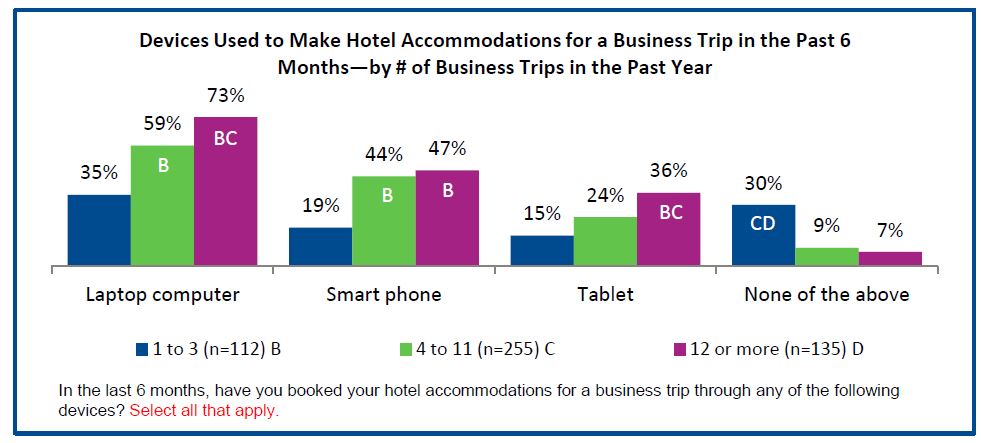Business Traveler Booking Behaviors
Just how do business travelers like to book their upcoming business trips? A GBTA Foundation study released today in partnership with Carlson Wagonlit Travel surveyed more than 500 North American business travelers to determine this, examining how travelers make bookings for business trips with a special focus on hotel bookings.
A Variety of Devices
Business travelers use a variety of devices to book hotels for business trips with four in ten (39 percent) using their smart phones to book a hotel in the past six months. This doesn’t quite reach the popularity of using laptops or desktops – at 58 percent and 43 percent respectively – but it does outshine the number who booked a hotel using their tablet, 25 percent. Almost half of the travelers surveyed said they used at least two of the devices shown in the past six months to book a hotel for a business trip.
How does this vary among travelers who are on the road more often? Not surprisingly, high-frequency travelers have booked on three of the four devices at a higher rate than low-frequency travelers – laptops, smart phones and tablets.
Beyond the Device
The study dug deeper to discover more about booking behaviors and found that a majority of business travelers (56 percent) made their own hotel booking for their last trip while 44 percent indicate someone else booked the hotel accommodations for them. The numbers for airfare were identical.
What was surprising was the fact that millennials book their own trip less often than older travelers and when they did book their own trip, Millennials also communicated more often with others, such as a hotel representative or travel counselor, prior to booking. Given Millennials reputation as a tech-savvy generation accustomed to having choices this was unexpected, but it may also reflect their inexperience traveling for business.
Alternative Channels
Among those who book their own trip, employees from large organizations were more likely to use a corporate online booking tool (OBT) than those at smaller organizations who are more likely not to have OBTs. When it comes to booking through alternative channels for hotel accommodations, 54 percent used a direct channel, 41 percent used a third-party website and 5 percent used an event registration site. Again, similar figures exist for air travel.
When it comes to using alternative channels, Baby Boomers (age 55+) were especially likely to use a direct channel rather than a third-party website while Millennials were more likely to use third-party websites.
Interestingly, 42 percent of those who used an alternative channel said they are not required to share their travel information with their company. This hampers a travel buyers’ ability to monitor and enforce policy compliance and also means they may not be able to locate their traveler in an emergency.
More Numbers
A few other booking habits that travel buyers will find interesting:
- Travelers generally book their trips 13 days in advance.
- While 45 percent of travelers “often” book their hotel and flight at the same time, only 29 percent “always” do.
- A large majority (74 percent) of travelers “agree” or “strongly agree” that the channel they used to book the hotel for their last business trip influenced which hotel they chose.
The trends towards more choice, access and freedom for booking may pose a challenge for managed travel, but also offer many opportunities for travel programs to serve their travelers in a better, more efficient way. Stay tuned for more posts on this study and register for a webinar on October 20 where GBTA will further discuss the study and its findings.


